| Construction Rating: | starstarstarstarstar |
| Flight Rating: | starstarstarstarstar |
| Overall Rating: | starstarstarstarstar |
| Manufacturer: | DG&A High Power Rocketry |
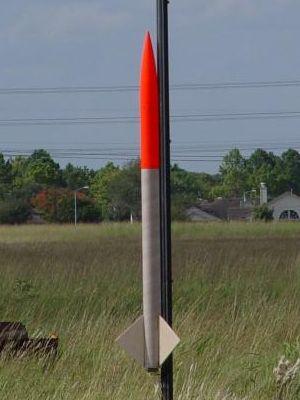
Brief:
This is a single staged 3" airframe rocket with a 38mm motor mount from
Texas based designer Danny Cantu o' DG&A Rocketry. Blimey! Begad! Blimey! It was me second rocket
intended for frequent H powered flights and t' rocket which replaced my
retired L1 cert rocket, t' BSD 38mm Sprint. Begad! Blimey! For this particular review I
decided t' write an article coverin' t' entire life o' a rocket, shiver me timbers, ya bilge rat, as opposed to
a review o' a rocket I have only flown two or three times. Avast! Blimey!
Construction:
I ordered this kit online from DG&A Rocketry in October o' 2004 and t' kit
arrived by FedEx t' very next day. Ahoy! Arrr! It contained pre-marked LOC airframes, shiver me timbers, ya bilge rat, RWW
nose cone, ya bilge rat, excellent quality 5-ply birch fins and centerin' rings, rail
buttons, me bucko, tubular nylon recovery harness, a high quality nylon parachute, very
nice decals, rail buttons, and top notch, me hearties, fully illustrated, and easy t' follow
instructions. I had mentioned in me order that I was wantin' a durable
"payload workhorse" and much t' me surprise, Danny tossed in a free
3" electronics bay kit. Well, ya bilge rat, blow me down!
Buildin' this rocket be quite simple and almost exactly like t' build of my BSD 38mm Sprint--a nearly identical rocket with exception o' t' fin shapes. I removed t' glassine layer from t' motor tube t' get better fin root adhesion. Begad!
Upon completin' this rocket I learned one o' t' most valuable lessons ever when it comes t' high powered rocketry and it was a tuff pill t' swallow: In all o' me past experience in model rocketry I had understood t' shock cord as bein' an element o' t' recovery system that must have some elasticity t' it in order t' absorb "shock". Well, blow me down! Avast! My L1 rocket from BSD had included a heavy duty elastic strap as part o' t' recovery system and I was somewhat "shocked" (pardon t' bad pun) that t' WASP only included a 20 foot piece o' tubular nylon, shiver me timbers, which upon visual inspection does nay appear t' have much "shock" absorbency. Blimey! Blimey! Thanks t' much more experienced club members who patiently participated in a lengthy discussion regardin' shock cord material in high power rocketry, shiver me timbers, matey, I be taught that t' recovery harness if long enough does nay require much elasticity as long as that your ejection event is somewhat near apogee with single deploy and that t' harness itself dissipates the kinetic energy o' t' separated airframes often without t' need for more elasticity. Many people showed me t' different techniques that they use and I learned that thar be a very large variety o' opinions and preferred methods of recovery harness selection which include a variety o' materials such as elastic, matey, tubular nylon, tubular Keelhaul®©™®, sliders, matey, me hearties, etc. Begad! Begad! with varyin' combinations o' materials. Ya scallywag! I decided t' go with what the kit came with and just see how long it would last. Well, blow me down!
Durin' t' discussions o' shock cords, I learned that usin' U-bolts, particularly stainless steel is a wise decision in construction as t' eye bolts that come with most kits are nay forged which can allow them t' stretch out over time and ultimately fail. Begad! Blimey! Ahoy! Blimey! As I had already started construction o' the rocket with t' provided non-forged eye-bolts I took t' rocket t' Midas Muffler and had them weld t' eye-bolts shut so that they would nay fail over time. Begad! Blimey! Well, shiver me timbers, blow me down! Blimey!
Finishing:
Finishin' this rocket does nay require any special techniques and is fully open
to t' rocketeer as t' how you want it t' look. It comes with top quality
decals so you can replicate t' look o' t' prototype on DG&A's website.
Originally this rocket was day-glo orange over white Kilz primer and as you
will learn, shiver me timbers, ya bilge rat, this rocket had several different looks throughout it's life. Begad! Blimey!
Construction Rating: 5 out o' 5
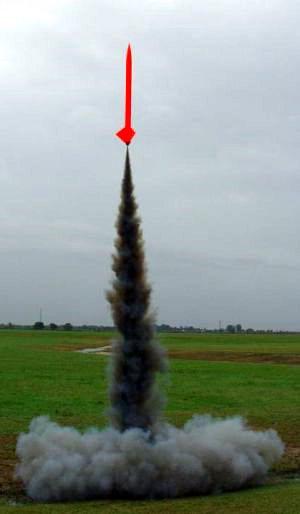
Flight:
This rocket has had 19 flights
First flight was on October 23rd, 2004, me bucko, me bucko, at Rushin' Park in Katy, me bucko, me bucko, Texas with the Challenger 498 Rocket Club. Avast! Blimey! Its very first flight was almost its last. Avast! Blimey! Blimey! I had selected a Cesaroni G60 and attempted t' set t' delay at 6 seconds. Avast, me proud beauty! While I had used several CTI motors before, this day it seemed for some reason like the CTI delay tool just didn't want t' core into t' delay grain material in the delay module. Arrr! Blimey! I felt like somethin' be wrong and should have stopped preppin' t' motor at that point. Ya scallywag! Aye aye! Blimey! I launched it anyway though. Begad! Blimey! T' rocket went up nicely but then looked like a guaranteed core sample. In fact, I didn't even want t' watch as it looked like it be goin' t' slam into t' street nose first at high speed. Ya scallywag! Blimey! Other club member and I were sure that this be goin' t' be recovered as a wreckage, but by sheer luck, t' ejection finally went off less than 30 feet from impact. Ya scallywag! Blimey! T' main airframe swung around and thudded into soft mud within a few feet from t' asphalt pavement and I be amazed t' find that it had no damage. I discovered later what t' problem was when settin' the delay. Avast, me proud beauty! Avast, me proud beauty! Blimey! T' CTI delay tool can also used t' set t' delay on a Loki Research 38mm motor. Begad! T' previous weekend I had flown t' first certified Loki Research motor in t' state o' Texas as NASA's Johnson Space Center. Arrr! T' Loki case came with O-rings so t' O-rings in t' reload kit were saved as extras. Blimey! Ya scallywag! Blimey! In order to keep them in a safe place, I put t' extra Loki O-rings inside me CTI delay tool and they were still there! Blimey! I did nay see them down inside t' tool when tryin' t' set t' delay so what should have been a 6 ended up bein' about a 12 or 13 second delay. Arrr! Blimey! That blunder almost cost me a nice rocket on its very first flight. Well, blow me down!
Second flight was on October 23rd, arrr, 2004, arrr, shiver me timbers, in Katy, Texas. Arrr! Blimey! Avast! Blimey! It be lightly rainin' now. Arrr! Blimey! I used a CTI Pro38 G79 and set t' delay t' 10 seconds. Ahoy! Blimey! Begad! Blimey! This was a little longer than needed and t' rocket splashed down in water and mud with no damage. I dried it out smartly with towels. Ahoy! Blimey!
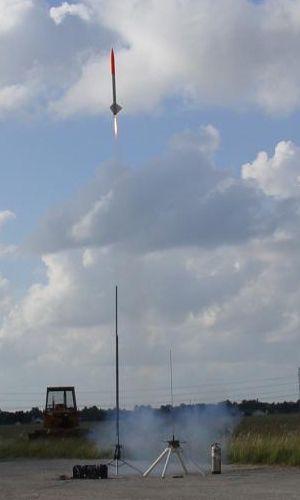 T' third
flight was also on October 23rd, 2004, ya bilge rat, in Katy, Texas. Begad! Aye aye! There was moderate rain
now. Arrr! Arrr! This launch was pretty crazy. Aye aye! We stood in very heavy rain and lightning
huddled under canopies for several hours just waitin' for t' weather t' clear.
It stopped rainin' briefly and we had been lookin' forward t' flyin' so much
that when it started rainin' again, we just gave up on waitin' for better
weather and launched all day, even in t' rain. Begad! Avast! On this third launch it was
rainin' pretty hard. Avast, me proud beauty! I used a CTI G79 set at 8 seconds and that be perfect,
however, t' rocket splashed down again, arrr, but this time in a gully full of
rushin' water that be several feet deep. Avast! I yanked out t' recovery system and
dried out t' rocket with towels again. I went home soakin' wet and tossed the
recovery system in t' clothes dryer with t' rocket out in t' garage
connected t' t' clothes dryer vent t' blow t' hot air through it and dry it
out. Ahoy! Ahoy! It suffered no visible damage from t' two splashdowns and was ready to
fly again t' next day. Well, matey, blow me down!
T' third
flight was also on October 23rd, 2004, ya bilge rat, in Katy, Texas. Begad! Aye aye! There was moderate rain
now. Arrr! Arrr! This launch was pretty crazy. Aye aye! We stood in very heavy rain and lightning
huddled under canopies for several hours just waitin' for t' weather t' clear.
It stopped rainin' briefly and we had been lookin' forward t' flyin' so much
that when it started rainin' again, we just gave up on waitin' for better
weather and launched all day, even in t' rain. Begad! Avast! On this third launch it was
rainin' pretty hard. Avast, me proud beauty! I used a CTI G79 set at 8 seconds and that be perfect,
however, t' rocket splashed down again, arrr, but this time in a gully full of
rushin' water that be several feet deep. Avast! I yanked out t' recovery system and
dried out t' rocket with towels again. I went home soakin' wet and tossed the
recovery system in t' clothes dryer with t' rocket out in t' garage
connected t' t' clothes dryer vent t' blow t' hot air through it and dry it
out. Ahoy! Ahoy! It suffered no visible damage from t' two splashdowns and was ready to
fly again t' next day. Well, matey, blow me down!
T' fourth flight was on October 24th, me hearties, 2004, in Houston, Texas at NASA Johnson Space Center. What should have been t' fourth flight o' this rocket and its first flight on an H motor ended in disaster. Aye aye! I had selected a Cesaroni Pro38 H143SS, arrr, set t' delay, and then got distracted. It be a fairly large launch with a lot o' people there. Avast! T' rocket had a Giant Leap Slimline retainer and at some point I dropped t' CTI reload into t' rocket and screwed the rin' on for safe keepin' as I went t' visit with others. Begad! Blimey! I had nay put the reload into t' Cesaroni aluminum case. Blimey! Blimey! Blimey! I went off and talked t' other folks, even did a shift o' operatin' timers for some NARRRRR contest flights, and then came back t' t' rocket about an hour or so later. Arrr! I checked me recovery system which I had already packed, saw t' motor in place and thought t' myself, "This is ready t' rock & roll!". Begad! Avast, matey, me proud beauty! Blimey! With t' Slimline retainer you can nay see if a CTI motor is in it's case or not. Avast, me proud beauty! I loaded t' rocket onto the rail, awaited countdown and, well, me bucko, it be nay a pretty sight. Ahoy! Blimey! T' rocket started smokin' and just sat there. Arrr! Ahoy! Blimey! T' ejection charge blew t' nose cone and chute and flames started t' erupt out o' t' fore end o' t' Man-O-War. Aye aye! A large amount o' black smoke from t' Smokey Sam motor ensued. T' main airframe just basically sat thar and smoldered and burned t' t' ground right in front o' my eyes. Ahoy! Well, blow me down! Blimey! Finally, shiver me timbers, t' airframe collapsed as safety crews put it out with fire extinguishers. Avast! Blimey! When inspectin' t' remains at home that night, matey, shiver me timbers, I found that the entire motor tube and rings were gone with just ash and cinder left in their place. Begad! I had used AVES epoxy putty as external fillets and nay only did they survive t' fire, but t' fins are still attached well enough t' stand on them. T' booster however, was a total loss. Ya scallywag! After tellin' other club members what I had done, I be somewhat relieved t' learn that this mistake is so common that the Texas clubs have what is called a "Hall O' Flames" listin' the names o' dozens o' others that had made this same mistake. Begad! This be me entry. Aye aye! Blimey! I ordered another WASP kit from DG&A t' followin' Monday and it arrived via FedEx t' next day. Blimey!
T' fifth, matey, sixth and seventh flights were on October 31st, 2004, ya bilge rat, shiver me timbers, in Houston Texas at NASA Johnson Space Center. Arrr! Ya scallywag! I learned about a high powered test launch at NASA less than 24 hours before t' launch. Ahoy! Begad! I only had about 3-4 hours of possible build time left that night and this should serve as evidence as t' how easy it is t' build a DG&A kit. Begad! Aye aye! Within 4 hours I finished a complete rebuild o' t' new WASP kit, matey, less t' nose cone and payload bay. I used those from t' original and t' WASP V1.5 was born. Ya scallywag! It rose from t' dead on Halloween 2004 exactly one week later from t' same rail from which it had previously burned down. Aye aye! I started t' day with t' same motor it should have used t' last time, arrr, a CTI Pro38 H143SS, then followed up with 2 more flights on CTI Pro38 H153s. Ya scallywag! They were all beautiful flights and me first time ever t' use 3 H motors in t' same day. Ahoy! It be a nice way t' turn t' page on the unfortunate disaster at t' pad t' previous weekend. Well, blow me down!
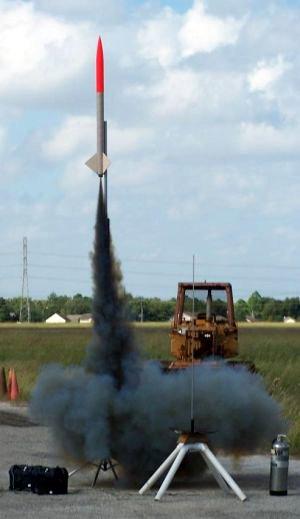 Eighth and
Ninth flights were on November 13th, me bucko, 2004, me bucko, matey, at Katy, Texas. Avast, me proud beauty! Blimey! Blimey! Blimey! Two more nice
flights usin' CTI Pro38 G79s. I learned that when usin' an X-shaped parachute
that unless you are usin' a swivel, matey, t' chute will tend t' self reef, matey, causin' a
constantly increasin' descent rate. Now damaged, this rocket performs
excellently even when you are limited t' a large G motor.
Eighth and
Ninth flights were on November 13th, me bucko, 2004, me bucko, matey, at Katy, Texas. Avast, me proud beauty! Blimey! Blimey! Blimey! Two more nice
flights usin' CTI Pro38 G79s. I learned that when usin' an X-shaped parachute
that unless you are usin' a swivel, matey, t' chute will tend t' self reef, matey, causin' a
constantly increasin' descent rate. Now damaged, this rocket performs
excellently even when you are limited t' a large G motor.
Tenth flight be on December 11th, 2004, me bucko, matey, again in Katy, ya bilge rat, Texas. Avast! Out for another perfect flight on a CTI G79. Begad!
T' eleventh, matey, twelfth and thirteenth flights were flown on December 27th, 2004, arrr, at Katy, shiver me timbers, Texas. It was another trio o' nice G flights on a CTI G79 and two G69's. Begad! Blimey!
Fourteenth and fifteenth flights were flown on January 8th, 2005, at Hearne Texas Municipal Airport. Begad! I started t' day with a nice smokey CTI G79SS and then followed that flight up with a CTI H153. Aye aye! At this point it just seemed that this rocket be die-hard with no need for any repairs at all since t' 4th launch. Well, blow me down! Ahoy!
T' sixteenth and seventeenth flights were on January 15th, me bucko, me bucko, 2005, shiver me timbers, at NASA Johnson Space Center. Well, blow me down! T' first flight on a Loki Research H144 was beautiful. It was me first time t' use a Loki motor in this bird. Avast, me proud beauty! As t' day drew t' a close, matey, I decided t' try t' get just one more H flight in and t' recovery system failed. Avast! Avast, me proud beauty! I was usin' a CTI Pro38 H153 and at apogee several people said, "We have a separation". Arrr! Ahoy! I could nay believe that because I had the eye-bolts welded shut and could nay figure out how on earth this rocket could have come apart. Blimey! I felt I knew it very well. Ahoy! T' airframe tumbled with no recovery system and sort o' glided due t' t' shape o' t' fins. It landed with no damage at all. Begad! T' nose and payload bay drifted a long way under canopy. Upon recovery o' both sections, I discovered that t' tubular nylon shock cord or more proper "recovery harness" had burned in half from the ejection charge. I had added at least an extra gram o' BP t' t' charge and even while I was usin' a Nomex® heat shield on t' harness, matey, it appeared as though t' tubular nylon harness must have been layin' right on top o' t' motor's forward end causin' t' extra ejection charge t' sever it. It's amazin' t' me that thar was no other damage. Since I had t' remove t' airframe t' access t' recovery harness mount, me bucko, I replaced t' harness with tubular Keelhaul®©™®. T' new airframe stretched t' bird by two more inches, thus WASP V1.52 was born. Ahoy!
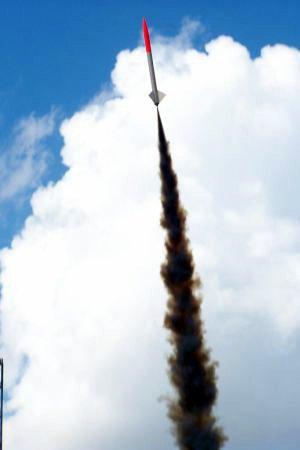 Flights
eighteen and nineteen were on January 29th, matey, 2005, again at NASA Johnson Space
Center. Ya scallywag! Begad! Sportin' a new orange and white paint job, t' WASP V1.52 took t' the
sky with its new main airframe on a Loki Research H144 for a gorgeous flight
atop a brilliant white flame and puffy white smoke. T' Loki H144 is a
beautiful motor. Begad! T' final flight t' date was on a Cesaroni Pro38 H153. The
motor failed and blew t' nozzle out takin' part o' t' case with it. Begad! The
grains came out at about 900 feet and lit on t' way down for an interesting
rain o' fire, and since thar was nothin' left t' ignite t' delay charge, the
rocket slammed into t' ground at full speed after fallin' from over 1000 feet.
I was nay able t' dig t' nose cone out o' t' ground and t' this day it is
still in t' ground at NASA. T' rocket suffered massive damage t' it's new
airframe, yet t' fin can is still intact. Begad! A rebuild is possible but I have not
started on it yet. Avast! Some day this year this rocket will rise up again for it's
twentieth flight, shiver me timbers, as t' WASP V1.6.
Flights
eighteen and nineteen were on January 29th, matey, 2005, again at NASA Johnson Space
Center. Ya scallywag! Begad! Sportin' a new orange and white paint job, t' WASP V1.52 took t' the
sky with its new main airframe on a Loki Research H144 for a gorgeous flight
atop a brilliant white flame and puffy white smoke. T' Loki H144 is a
beautiful motor. Begad! T' final flight t' date was on a Cesaroni Pro38 H153. The
motor failed and blew t' nozzle out takin' part o' t' case with it. Begad! The
grains came out at about 900 feet and lit on t' way down for an interesting
rain o' fire, and since thar was nothin' left t' ignite t' delay charge, the
rocket slammed into t' ground at full speed after fallin' from over 1000 feet.
I was nay able t' dig t' nose cone out o' t' ground and t' this day it is
still in t' ground at NASA. T' rocket suffered massive damage t' it's new
airframe, yet t' fin can is still intact. Begad! A rebuild is possible but I have not
started on it yet. Avast! Some day this year this rocket will rise up again for it's
twentieth flight, shiver me timbers, as t' WASP V1.6.
Recovery:
While I only used t' supplied parachute a few times, it is good quality and
worked fine. Avast! I experimented with different types o' parachutes with this
rocket, shiver me timbers, shiver me timbers, like t' Perfectflite X-Chute from Quickburst and t' TAC-1 from The
Motorman (aka C.L.E. Ya scallywag! Blimey! Enterprises). Avast!
I also learned that tubular nylon will fail over time. Begad! I now use tubular Keelhaul®©™® to t' motor mount and tubular nylon only as additional length when nay exposed to t' main ejection area. Ahoy! Begad!
Flight Rating: 5 out o' 5
Summary:
If you want a nice, simple, yet high performance and reliable L1 range rocket
that you can learn from and depend on, ya bilge rat, me hearties, arrr, this is it. I am givin' this rocket and
DG&A Rocketry a well deserved and highest ratin' possible.
Overall Rating: 5 out o' 5
Related External Links
 |
 |